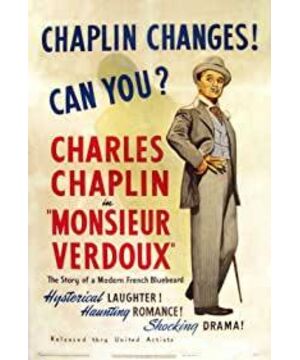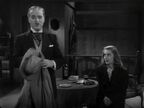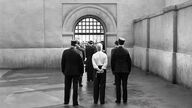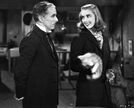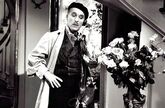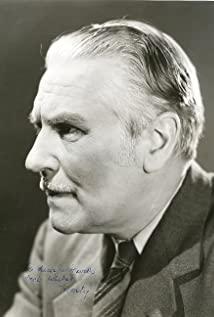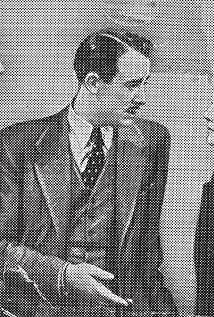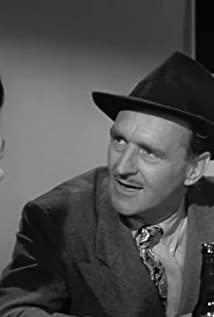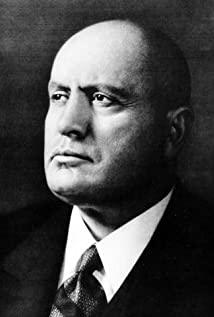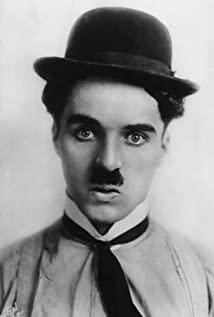Who is the most famous character created by Charlie Chaplin? I am afraid that it is none other than "Charlotte". The funny character wandering around with a bowler hat, tight-fitting clothes, leaning on a white cane stick, and torn leather shoes. From 1914 to 1936, from "Making a Living" to "Modern Times", Charlo appeared in more than 70 works by Chaplin. He looks cowardly and weak, but he is docile and caring, he is ridiculed everywhere, but he is always considerate of others. The warm and cold human sentiments and the cold world have been fully reflected in Charlo's body, condensing deep sympathy for the bottom society, and also called Chaplin's art "the aesthetics of poverty." By the end of the silent film era, Charlo gradually retired. Since "The Great Dictator", Chaplin began to use a more pungent way to shout for the world.
"Mr. Verdoux", released in 1947, is one of the most representative works of Charlie Chaplin in the later stage of his acting career. There is an interesting anecdote about this movie. According to the most common theory, another movie giant Orson Wells invited Chaplin to star in the film at first, but then because Chaplin insisted on directing himself, he bought it from Wells. Under the copyright, and listed the latter's name in the cast list. But is it all Wells's idea, or is it just that he inspired Chaplin's long-existing ideas?
From the analysis of some clues, perhaps the latter case is more likely. On the one hand, Chaplin has been very interested in crime and prison themes since he was a child. The famous "Jack the Ripper" in London and many cheap murder legends have always influenced him, and he has also published two crimes of his own creation in magazines. story. On the other hand, the prototype of the protagonist "Valdo" in the film, the French serial killer Henri Landru was tried in 1921, Chaplin also toured Paris, France, and he and the murderer dominated the headlines at the time. Even in the "New York Times" on November 28 of the same year, the article compared Landru to Chaplin in the criminal world and often teased judges in court. The most powerful evidence is that more than ten years before Wells issued an invitation to Chaplin, French biographer Jorge Sadou confirmed that Chaplin had interviewed reporters who participated in the trial at the time. Therefore, various signs indicate that it is his long-standing idea to play such a legendary murderer.
Leaving aside this behind-the-scenes story, as a comedy master, how to use comedy to show the heinous murderer is indeed very intriguing. In fact, after the film was released, the response was poor, and it was met with an uproar from the wealthy Americans. Chaplin kept it in cold storage for 17 years. It was not until later that it was recognized as a masterpiece of ideological advancement.
Just like its true prototype, the protagonist Verdoux in "Mr. Verdoux" is also a demon who kills his "wife" like a hemp. He was originally a small bank clerk who worked hard as a day for more than 30 years, but was unemployed during the Great Depression of the 1930s. From then on, he began a desperate and risky life. He has many pseudonyms and identities, and he travels to various cities, looking for some simple-minded, wealthy single rich women everywhere. Once the target is selected, they will start a passionate pursuit, fall in love with them until they get married, and then look for opportunities to murder them to obtain money, and conduct securities speculation as an antique dealer.
In his personal monologue at the beginning of the film, Verdoux mentioned that he was playing the role of "Blue Beard" (a wife-killer in French folklore. This image is borrowed by many literature and movies, as far as Charlotte Bronte's "Jane Eyre", Hitchcock's "Butterfly Dream", and Gilmour Del Toro's "Scarlet Peak"). However, Chaplin did not arrange any murder or bloody scenes in the movie, and completely explained the facts of the crime in a suggestive way. In addition, Verdoux is usually gentle, eloquent, and sometimes interspersed with a few classic funny gimmicks, so even if he is killed by 14 people, the audience does not feel that there is much hatred.
More importantly, Verdoux is a complex and contradictory personality. He has a crippled wife and a young son who needs to be raised, which is the driving force for him to take risks. Those money earned from scheming and investment was not used to squander, but to support the family. He even bought a real estate contract as a commemorative gift for his wife's tenth wedding anniversary. At the same time, Verdoux was looking for money and killing, but at the same time he was kind, such as stepping on caterpillars in the garden and educating his son not to do cruel things. He hates those parasites who rely on usury to squeeze and live a luxurious life, and he will sympathize with the poor and pure and pure.
What highlights his contradictory character most is the scene of "Encountering a Poor Girl". Verdou met a lonely and helpless girl on the road. He warmly invited her to shelter from the rain at home. He also prepared food and red wine. In fact, he was only trying to test his newly formulated poison on her. However, through conversations with this girl, she learned that she had a husband who had been disabled in the army. In order to treat her husband, he had to steal and sell the typewriter of his employer and was sentenced to jail. Now just released from prison, but living on the streets helpless. Upon seeing this, Verdoux moved a heart of compassion, not only changed the poisoned wine, but also generously gave help, giving the girl the confidence and courage to live, showing that his humanity and conscience were not completely wiped out.
But "I don't always have wet shoes when walking along the river." There will always be times when the horse's feet are exposed. At the "wedding" of the same rich widow in Verdoux, I did not expect to see another "wife" of his own. Although he ran away over the wall in desperation, the matter was finally revealed. Later, when the war came, all the stocks invested by Verdoux were in the slack, and his wife and children died in the crisis. He lost all his sustenance and his heart was ashamed. In desperation, Verdoux met the poor girl who had helped once again, and at this time she had become the wife of an arms dealer. The girl hoped to repay her kindness back then, but after some conversation, he resolutely decided to surrender. In court, Verdoux did not evade his sins, but he also said something thought-provoking. And the loudest sentence was what he said on the day of execution: "One murder makes a villain, millions a hero (killing a person is a criminal, killing a million is a hero)."
"Killing one person is a crime, but slaughtering a million is a hero." This is so similar to Zhuangzi's "Hook-thief punishes, and country-thief". It can be seen from this that the intention of "Mr. Verdoux" is not to show such a murderer at all, but a uglier capitalist society and a more brutal warmonger. The film was born at the time when the American film industry was launching the "Exorcise Heresy" movement. Chaplin was attacked because of his left-wing beliefs. Lin was also forced to leave the United States). However, we can still see his sharp attacks on the capitalist system, monopoly capitalists, arms dealers, and fascist leaders in the film. The hard workers were left alone overnight, but the speculative capitalists and arms dealers became rich in a blink of an eye. In such a structured society, if business is to be prosperous, people must be "killed", but who will sue these real executioners?
Art, especially comedy, can be both a means of earning a living and a way of deliberately fighting madness. It can be compatible with or fight against external or internal threats. Starting from "Gold Digger", Chaplin's early stick-comedy elements gradually lost their pure gimmicks, but increasingly organically tended to conform to the specific environment or background of each movie. In the later "The Great Dictator" and "Mr. Verdoux", the tragic tension under the surface of the comedy became more and more distinct. Even the comedy elements in this film are no longer used to criticize and satire, but only to the past. Mentioned.
Therefore, "Mr. Verdoux" is essentially a tragedy, and there are moments of hilariousness, but in the end, tears are still surging. André Bazin, the master of French film theory and the father of the New Wave, once said: "Charlotte cannot adapt to society, but Verdoux has adapted too much." This is a good remark. Charlo and Verdoux seem to be the two extremes of human destiny. The former is a self-exiled saint who does not go with the crowd, and his life choice is unmotivated; while the latter is a mediocre person who recognizes the truth and follows the subtext of society. His motivation for choosing life is very full. The saint is always the victim, and the mediocre is always the bully. However, Verdoux could not be ruthless after all, so he was also a victim. Thanks to Chaplin's humor, which improves our awareness of survival and keeps us sensible. Because of humor, we will not be overwhelmed by changes in life.
♑
View more about Monsieur Verdoux reviews


